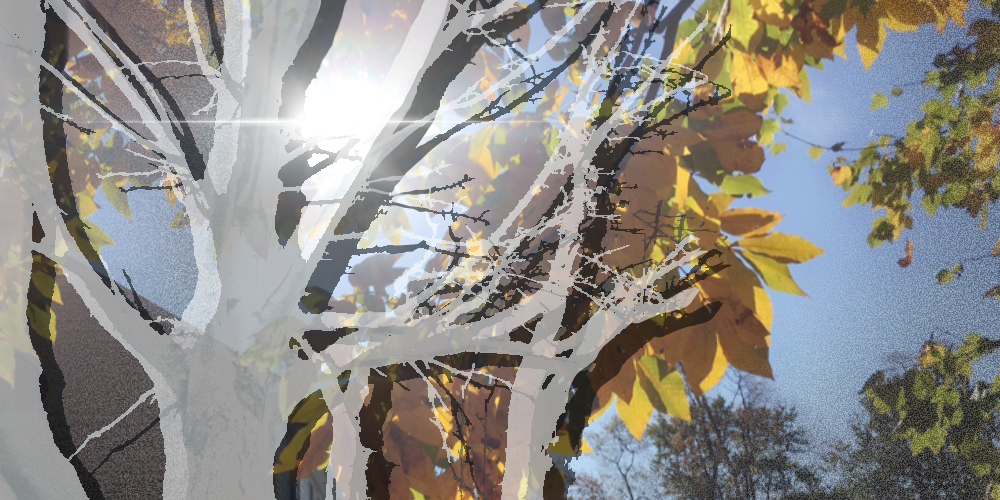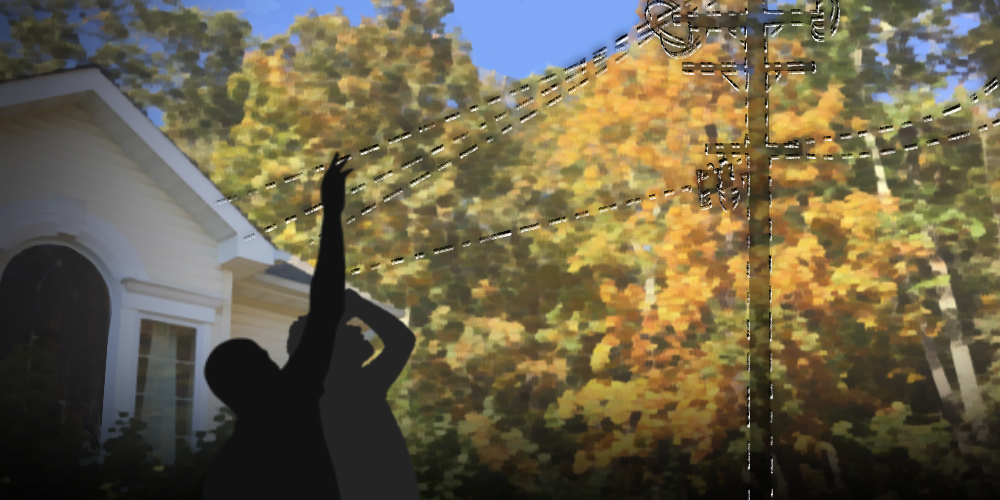Every now and again you look out the window and see a suspicious character loitering on the street. What is he doing? Well, he is either the agent of destruction that some dark part of you always knew would one day come, or he has been sent by the town to spraypaint excavation hieroglyphs on the asphalt.
But it is the third possibility — the most sinister of all — that finally prompts you to take action. Because maybe he’s actually the former, but masquerading as the latter to carry out the former’s sinister work!
Or so it goes in my addled noggin after two-plus years of Covid-induced paranoia.
“Hey there!”
Striding barefoot down the walk I hail him robustly: a heavyset fellow on this occasion, with frizzy red hair and a worried look, as if he recently misplaced his clipboard. He’s standing beneath the two great oaks in my front yard and the newly implanted telephone pole beside them. Checking, he said, if the trees will need trimming when the lines are moved.
There is a certain neighborly pleasure in chatting up the folks whom fate brings by to do work on the street — once you’ve checked their IDs, patted their pockets, and eyeballed their pupils of course. When else do you get to idle manfully outside your home and give weighty thought to issues you know next to nothing about?
Being of modest disposition and more prone to repress conflict than court it, I tend to go along with the experts on these occasions. Whatever they deem fit. If the oaks need trimming, far be it from me to stand in the way.
And yet as we stood there gazing up a certain disquiet began to gather. Was it possible that I was failing here in some duty to defend my oaks, which despite their great size were armed only with acorns, and these only in the fall?
“Tell me again why the trees need to be cut?”
“Well, they put the new pole in,” the man mumbled, “so we’re going to have to move the wires back a few feet.”
“Right.” I hesitated, gnawing a lip. I do pride myself on being un-fussy. Being un-fussy is one of the greater virtues, right up there with kindness and cleanliness. On the other hand —
“So why again are they replacing the poles?”
“They just have to replace them now and then,” the tree guy said vacantly.
“Aha.”
The obvious answer was that the old poles were rotting. Though from where I stood it looked like they still had a few good years left. How long did it take for a tar-slathered telephone pole to rot? Was there a pole schedule taped inside a desk drawer somewhere that tracked this sort of thing? What happened to all the old poles once they were replaced? Were they treated nicely, planted in an empty field somewhere, klatched in little groups so they could finally exchange decades of pent-up bon mots? Or were they just dumped in a ditch and forgotten? Did I have any say in this?
This last one I said out loud, and the tree guy acknowledged that I did have a say, for the tree work could not proceed without my signature.
So, it was a signature thing. If I had known it was a signature thing I would never have emerged in the first place.
I sighed, shouldering the burden bravely. There was nothing I could do for the poles. The poles were goners, even if I didn’t sign.
The oaks, though.
“Seems to me things might work out better if you went along with the pole guys when they’re planting the new poles,” I ventured. “That way, you could say: Hey guys, maybe we could plant the pole a bit farther from the oaks.”
The tree guy nodded. I nodded, too. I liked the tree guy. His face exuded unease and little sweat beads. This was a man who, because of his job, spent a lot of time wandering around looking upward. He was, in other words, a lot like me.
But sometimes in this life, you have to pick a side — in this case the easy camaraderie of the tree guy, or the sublime, low-IQ company of oaks.
“Here’s what I’m wondering,” I said, “and I’m really not trying to be difficult but, why did the pole guys install the new poles one foot closer to the house? Because, I mean, if you cut those branches off, who’s to say the trees won’t die?
“We lost two oaks in the last few years,” I went on, gathering umbrage. “I don’t know if I could handle losing two more.”
I wondered if this were true, and gave it around a 70 percent chance. When I ran the calculation again, a second later, the number had gone up 10 points.

“Well the general rule of thumb is you can cut away a third of the crown,” the tree guy said.
We were now in opposition. The mighty oaks towered above us, awaiting their fate. Passive bastards. They gave a little wave with their half-million leaves. Have you ever wondered why all tree leaves are roughly the same size? I have wondered about this.
I should say that there is something a bit unusual about the two oaks in my front yard, which is that a kind of garland is suspended between them about 25 feet up. The garland is comprised of plate-sized wooden cut-outs painted in various shades of green strung on a 1/8” cable. I installed the garland several years ago after enduring enough northern winters to know what they entailed: the complete obliteration of all color, except maybe blue which only watercolorists notice anyway. Now, though, when winter came, this one garland of greenery would remain. When summer came it would fade discretely into the foliage, and emerge again in winter.
I enjoy trees. I did as a kid, too. I spent most of my childhood in them, draped along their cool gray trunks. As an adult, I abandoned this early love. Living in the city, self-importantly striding sidewalks, who had time for trees? When I finally left the city and moved to where I live now, the first thing I did was slaughter a slew of them to create running space for the children. Down they came: WHAM WHAM WHAM. The tree cutters, yahoos, and nihilists all — each in their own way, already felled by some inner trauma — sneered as they toppled.
Finally, a great oak struck the earth like a titan’s hammer, and the whole neighborhood jumped. As if answering a doorbell, a Bigfoot figure suddenly appeared at the forest edge, waving his arms and shouting incoherently. He was my enraged neighbor. It was the first time I’d met him. In retrospect, I can imagine him sitting in his living room, furiously gripping the thin edges of his newspaper as the trees came pounding down. Who was this barbarian wantonly slaughtering trees without so much as checking with him first? What about biodiversity? What about the wildlife corridor? What about basic decency? When the great oak fell he finally overcame his forbearance and stormed out the door.
A month later he had moved out. That’s how offended he was.
I thought of him now, a gentle soul whom I had injured deeply.
“If we don’t trim them there’s a chance your house will burn down,” the tree guy said.
By this point however it was no use trying to convince me. He might as well have been trying to reason with Bigfoot.•




